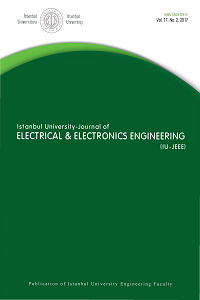Abstract
Turbo codes apply an
iterative message passing mechanism between two concatenated decoders. Their
astounding performance has led to their widespread adoption in several
communication standards such as Long Term Evolution (LTE), and Code Division
for Multiple Access (CDMA) 2000. This paper gives an overview of three bit-level
decoding Max-Log-MAP algorithms with Sign Difference Ratio (SDR)-based early
stopping that can be used in LTE Turbo Codes. A detailed computational
complexity analysis is given for the three methods. It is observed that the
complexity of the decoding methods decrease significantly as the Eb/N0
increases when SDR is used. Moreover, the Bit Error Rate (BER) performance of
the methods was also assessed and compared for different modulation schemes.
Results show that the different methods perform differently in the waterfall
and error-floor regions with different modulation schemes. Moreover, the
computational complexity analysis show that Method 2 requires fewer overall
number of computations compared to Methods 1 and 3.
References
- [1] C. Berrou, A. Glavieux and P. Thitimajshima, "Near Shannon limit error-correcting coding and decoding: Turbo codes," in IEEE Trans., May 1993.
- [2] Y. Beeharry, T. P. Fowdur and K. M. S. Soyjaudah, "Symbol Level Decoding Algorithms for Duo-Binary Turbo codes," IIUM Journal (Article in Press), 2017.
- [3] F. Li and A. Wu, "On the New Stopping Criteria of Iterative Turbo Decoding by Using Decoding Threshold," IEEE Trans. on Signal Processing, vol. 55, no. 11, pp. 5506 - 5516, 2007.
- [4] Z. Wang, H. Suzuki and K. K. Parhi, "VLSI implementation issues of turbo decoder design for wireless applications," Proc. of IEEE Workshop Signal Process. Syst., pp. 503 - 512, 1999.
- [5] J. Hagenauer, E. Offer and L. Papke, "Iterative decoding of binary block and convolutional codes," IEEE Trans. Inf. Theory, vol. 42, no. 2, pp. 429 - 445, 1996.
- [6] R. Y. Shao, S. Lin and M. P. C. Fossorier, "Two Simple Stopping Criteria for Turbo Decoding," IEEE Trans. Commun., vol. 47, no. 8, pp. 1117 - 1120, 1999.
- [7] Y. Wu, B. Woerner and J. Ebel, "A Simple Stopping Criterion for Turbo Decoding," IEEE Commun. Lett., vol. 4, no. 8, pp. 258 - 260, 2000.
- [8] F. Khan, LTE for 4G Mobile Broadband Air Interface Technologies and Performance, Cambridge University Press, 2009.
- [9] "3GPP: Technical Specifications Rel. 8," 3GPP, 2009.
- [10] B. Vucetic and J. S. Yuan, Turbo Codes: Principles and Applications, Kluwer Academic Publications, 2000, pp. 58-75.
- [11] T. P. Fowdur, Y. Beeharry and K. M. S. Soyjaudah, "Performance of Turbo coded 64-QAM with Joint Source Channel Decoding, Adaptive Scaling and Prioritised Constellation Mapping," in CTRQ, 6th International Conference on Communication Theory, Reliability and Quality of Service, Venice, Italy, 2013.
- [12] T. P. Fowdur, Y. Beeharry and K. M. S. Soyjaudah, "Performance of LTE Turbo Codes with Joint Source Channel Decoding, Adaptive Scalig and Prioritised QAM Constellation Mapping," International Journal on Advances in Telecommunications, vol. 6, no. 3 & 4, pp. 143 - 152, 2013.
- [13] L. Li, "University of Southampton," 2015. [Online]. Available: http://users.ecs.soton.ac.uk/rm/wp-content/liang_li_nine_month_report.pdf. [Accessed 18 April 2015].
- [14] V. Tursenia, "Performance Comparison of Turbo Code in WiMAX Sysetem with Various Detection techniques," International Journal of Engineering Research, vol. 2, no. 3, pp. 232 - 236, 2013.
- [15] S. A. Abrates, April 2004. [Online]. Available: http://paginas.fe.up.pt/~sam/textos/From%20BCJR%20to%20turbo.pdf. [Accessed 01 May 2015].
Abstract
References
- [1] C. Berrou, A. Glavieux and P. Thitimajshima, "Near Shannon limit error-correcting coding and decoding: Turbo codes," in IEEE Trans., May 1993.
- [2] Y. Beeharry, T. P. Fowdur and K. M. S. Soyjaudah, "Symbol Level Decoding Algorithms for Duo-Binary Turbo codes," IIUM Journal (Article in Press), 2017.
- [3] F. Li and A. Wu, "On the New Stopping Criteria of Iterative Turbo Decoding by Using Decoding Threshold," IEEE Trans. on Signal Processing, vol. 55, no. 11, pp. 5506 - 5516, 2007.
- [4] Z. Wang, H. Suzuki and K. K. Parhi, "VLSI implementation issues of turbo decoder design for wireless applications," Proc. of IEEE Workshop Signal Process. Syst., pp. 503 - 512, 1999.
- [5] J. Hagenauer, E. Offer and L. Papke, "Iterative decoding of binary block and convolutional codes," IEEE Trans. Inf. Theory, vol. 42, no. 2, pp. 429 - 445, 1996.
- [6] R. Y. Shao, S. Lin and M. P. C. Fossorier, "Two Simple Stopping Criteria for Turbo Decoding," IEEE Trans. Commun., vol. 47, no. 8, pp. 1117 - 1120, 1999.
- [7] Y. Wu, B. Woerner and J. Ebel, "A Simple Stopping Criterion for Turbo Decoding," IEEE Commun. Lett., vol. 4, no. 8, pp. 258 - 260, 2000.
- [8] F. Khan, LTE for 4G Mobile Broadband Air Interface Technologies and Performance, Cambridge University Press, 2009.
- [9] "3GPP: Technical Specifications Rel. 8," 3GPP, 2009.
- [10] B. Vucetic and J. S. Yuan, Turbo Codes: Principles and Applications, Kluwer Academic Publications, 2000, pp. 58-75.
- [11] T. P. Fowdur, Y. Beeharry and K. M. S. Soyjaudah, "Performance of Turbo coded 64-QAM with Joint Source Channel Decoding, Adaptive Scaling and Prioritised Constellation Mapping," in CTRQ, 6th International Conference on Communication Theory, Reliability and Quality of Service, Venice, Italy, 2013.
- [12] T. P. Fowdur, Y. Beeharry and K. M. S. Soyjaudah, "Performance of LTE Turbo Codes with Joint Source Channel Decoding, Adaptive Scalig and Prioritised QAM Constellation Mapping," International Journal on Advances in Telecommunications, vol. 6, no. 3 & 4, pp. 143 - 152, 2013.
- [13] L. Li, "University of Southampton," 2015. [Online]. Available: http://users.ecs.soton.ac.uk/rm/wp-content/liang_li_nine_month_report.pdf. [Accessed 18 April 2015].
- [14] V. Tursenia, "Performance Comparison of Turbo Code in WiMAX Sysetem with Various Detection techniques," International Journal of Engineering Research, vol. 2, no. 3, pp. 232 - 236, 2013.
- [15] S. A. Abrates, April 2004. [Online]. Available: http://paginas.fe.up.pt/~sam/textos/From%20BCJR%20to%20turbo.pdf. [Accessed 01 May 2015].
Details
| Subjects | Engineering |
|---|---|
| Journal Section | Articles |
| Authors | |
| Publication Date | July 27, 2017 |
| Published in Issue | Year 2017 Volume: 17 Issue: 2 |


